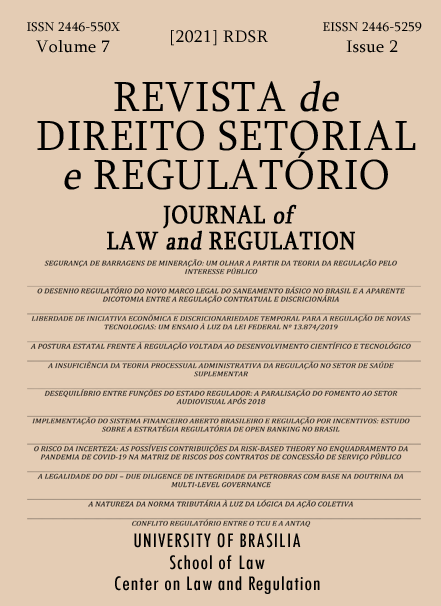The State standing on regulation focused on scientific and technological development
Palabras clave:
State regulation. Developmental State. Regulatory State. Scientific and technological innovation.Resumen
[Purpose] The present study intends to focus on the science, technology and innovation sector, presenting some difficulties faced and the recent interventionist and developmental state actions, addressing the State's attitude towards the regulation of the various economic sectors, in search of promoting an enabling environment scientific and technological development.
[Methodology/approach/design] This is a qualitative, basic, descriptive, and bibliographic research, seeking essentially to review the literature that addresses the proposed theme. This article will introduce the theme from a brief analysis of the Brazilian background in education, scientific production, and the transformation of scientific knowledge into innovative products and processes. Then, the state norms focused on science, technology and innovation will be analyzed, presenting some more recent examples of direct State intervention, in addition to addressing other regulatory instruments and techniques used to create an environment conducive to national scientific and technological development. The conclusion will seek to synthesize the central ideas developed in the text, concluding by the need to theorize regulation, in order to promote balance and prescribe the most appropriate dosage of regulatory instruments and techniques, within a well-articulated, intelligent and orderly strategy.
[Findings] At the end of the present study, without discarding the interventionist and entrepreneurial role of the developmentalist state, nor disregarding the importance of state incentives for the creation of a competitive environment that stimulates scientific and technological innovation, it will be sustained that the theory of regulation should promote balance and prescribe the most appropriate dosage of regulatory instruments and techniques within a well-articulated, intelligent and orderly strategy, which knows the mechanism of operation of the main sectors that contribute to scientific and technological development.
Descargas
Citas
ARANHA, Marcio Iorio. Manual de Direito Regulatório: Fundamentos de Direito Regulatório. 4ª ed. rev. ampl. – London: Laccademia Publishing, 2018. E-book.
BERCOVICI, Gilberto. Desenvolvimento, Estado e Administração Pública. In: CARDOZO, José Eduardo Martins et alii. Curso de Direito Administrativo Econômico. V. II. São Paulo: Malheiros, 2006.
BRANT, Danielle. Conexão fraca entre academia e mercado prejudica Brasil em ranking de inovação. São Paulo: Folha de São Paulo, 2018. Disponível em: https://www1.folha.uol.com.br/seminariosfolha/2018/08/conexao-fraca-entre-academia-e-mercado-prejudica-brasil-em-ranking-de-inovacao.shtml. Acesso em: 13/05/2021.
BRASIL. Instituto Nacional de Propriedade Industrial. Boletim Mensal de Propriedade Industrial – Estatísticas Preliminares. Rio de Janeiro: INPI, 2019. Disponível em: https://www.gov.br/inpi/pt-br/acesso-a-informacao/dados-abertos/arquivos/documentos/boletim-mensal-de-propriedade-industrial/bmpi-nov-2019.pdf. Acesso em: 13/05/2021.
BRITO CRUZ, Carlos Henrique de; e CHAIMOVICH, Hernan. Relatório UNESCO sobre Ciência 2010. O atual status da ciência em torno do mundo. Disponível em: http://unesdoc.unesco.org/images/0018/001898/189883por.pdf. Acesso em: 13/05/2021.
DE NEGRI, Fernanda. Novos caminhos para a inovação no Brasil. Washington, DC: Wilson Center, 2018.
LOPES, Othon de Azevedo Lopes. Fundamentos da Regulação. Rio de Janeiro: Processo, 2018.
NASCIMENTO, Paulo Augusto Meyer Mattos. Áreas de maior especialização científica do Brasil e identificação de suas atuais instituições líderes. Disponível em: https://www.ipea.gov.br/portal/images/stories/PDFs/livros/livros/livro_sistemas_setoriais.pdf. Acesso em: 13/05/2021.
Organização para a Cooperação e Desenvolvimento Econômico – OCDE. Educação. Disponível em: http://www.oecdbetterlifeindex.org/topics/education/. Acesso em: 13/05/2021.
PEDROSA, Renato Hyuda de Luna; e CHAIMOVICH, Hernan. Relatório de Ciência da UNESCO. Rumo a 2030. Disponível em: http://unesdoc.unesco.org/images/0023/002354/235407por.pdf. Acesso em: 13/05/2021.
SANTOS, C. R. L. dos. As contratações públicas e o Direito Regulatório. Revista de Direito Setorial e Regulatório, Brasília, v. 4, n. 2, p.97-120, outubro 2018.
SENA, Lucas. Regulação de novos mercados e inovação: uma abordagem a partir do Estado empreendedor e do interesse público. Revista de Direito Setorial e Regulatório, Brasília, v. 6, nº 1, p. 99-116, maio 2020.
VOLOTÃO, Romilson de Almeida. Direito regulatório, governança e licenciamento ambiental: soluções para o aperfeiçoamento do licenciamento ambiental brasileiro. Curitiba: Juruá, 2016.
Descargas
Publicado
Cómo citar
Número
Sección
Licencia
Derechos de autor 2021 Revista de Direito Setorial e Regulatório

Esta obra está bajo una licencia internacional Creative Commons Atribución 4.0.
Al enviar este documento a la Revista de Derecho, Estado y Telecomunicaciones, declaro que estoy aceptando los términos de Creative Commons Attribution 4.0 International (CC BY 4.0), disponible en http://creativecommons.org/licenses/by/4.0.


